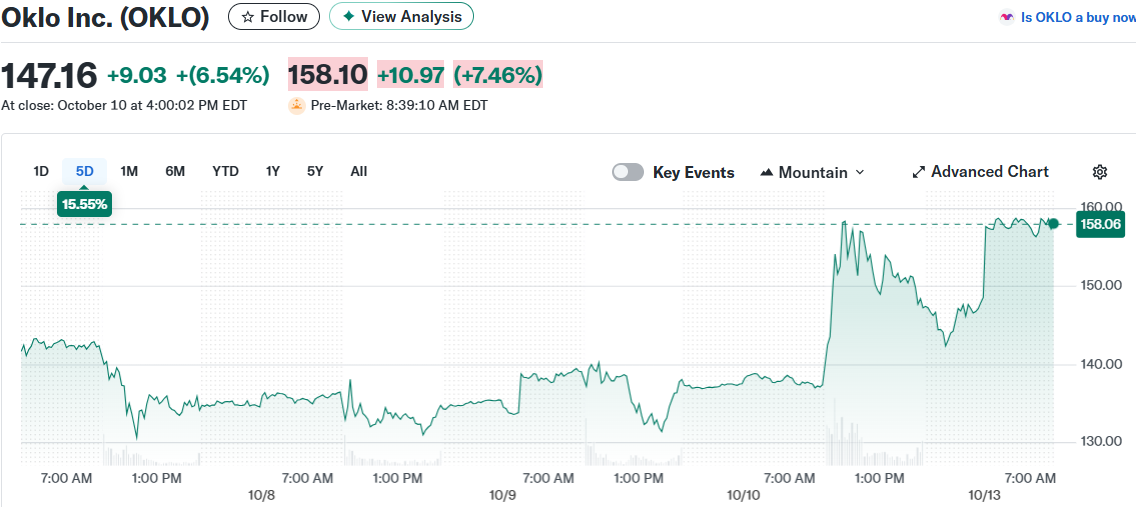TLDR
- Oklo stock jumped 6.5% to $147.16 despite zero revenue, driven by Canaccord Genuity’s buy rating and $175 price target
- The Department of Energy selected Oklo for its Advanced Nuclear Fuel Line Pilot Project to build three fuel-fabrication facilities
- Shares have exploded 1,130% in 12 months as investors bet on small modular reactors powering AI data centers
- The company’s $20 billion market cap raises concerns about valuation sustainability and potential shareholder dilution ahead
- Critics label the stock as meme-driven rather than fundamentals-based, comparing it to dot-com era speculation
Oklo stock climbed 6.5% Friday to close at $147.16 while major indexes declined. The pre-revenue nuclear energy company has delivered returns exceeding 1,130% over the past year.

The stock gained momentum after Canaccord Genuity initiated coverage Tuesday with a buy rating. The investment bank assigned a $175 price target, representing further upside from current levels.
Oklo received selection from the Department of Energy for its Advanced Nuclear Fuel Line Pilot Project. The company will build and operate three fuel-fabrication facilities supporting advanced reactor deployment.
The startup develops small modular reactors designed for data centers and industrial sites. Wall Street projects the AI power infrastructure market could reach $10 trillion as electricity demand from artificial intelligence operations continues growing.
Zero Revenue Meets $20 Billion Valuation
Oklo generates no revenue currently. The company reports no profits either.
The nuclear developer went public via SPAC merger in 2024. Its market capitalization now stands at $20 billion, matching established energy companies with proven cash flows.
This valuation gap creates questions about long-term sustainability. Oklo will likely require additional capital raises to fund reactor construction and regulatory approvals that take years to secure.
Management may issue secondary stock offerings while shares remain elevated. This strategy would provide necessary funding but dilute existing investors. Nuclear reactor development demands massive capital investment with extended timelines.
Department of Energy Partnership Provides Validation
The DOE pilot program selection offers technology validation for Oklo’s approach. The three fuel-fabrication facilities represent concrete progress toward commercialization goals.
Expected partnerships with government agencies and private enterprises will likely dominate 2026 headlines. These deals generate media attention but don’t produce immediate revenue streams.
Data center operators and cloud computing companies represent potential customers seeking alternative power sources. However, Oklo remains years from deploying working reactors at commercial scale.
Critics argue Oklo stock trades like a meme stock rather than traditional investment. Online forums promote the company as nuclear innovation’s next frontier while skeptics point to zero fundamentals.
The valuation appears driven by speculation rather than financial results. Day traders exploit volatility while institutional investors question sustainability.
Some analysts compare current conditions to dot-com era excesses when companies achieved massive valuations on promises rather than performance. The company hasn’t demonstrated compelling unit economics from any prototype.
Oklo’s position targeting AI infrastructure power needs offers legitimate potential. Data centers require enormous electricity to operate artificial intelligence systems. Small modular reactors could deliver reliable baseload power if successfully deployed.
Friday’s trading volume reached 747,901 shares against a 19.6 million daily average. Shares trade in a 52-week range of $9.01 to $161.41 after hitting all-time highs earlier this week.
The stock’s trajectory depends on executing technology development and navigating regulatory hurdles. Building nuclear reactors requires overcoming substantial technical and financial challenges before generating revenue.
Canaccord Genuity’s coverage initiation marks the first major investment bank backing from Wall Street. The buy rating and price target provide institutional credibility for retail-driven momentum.





